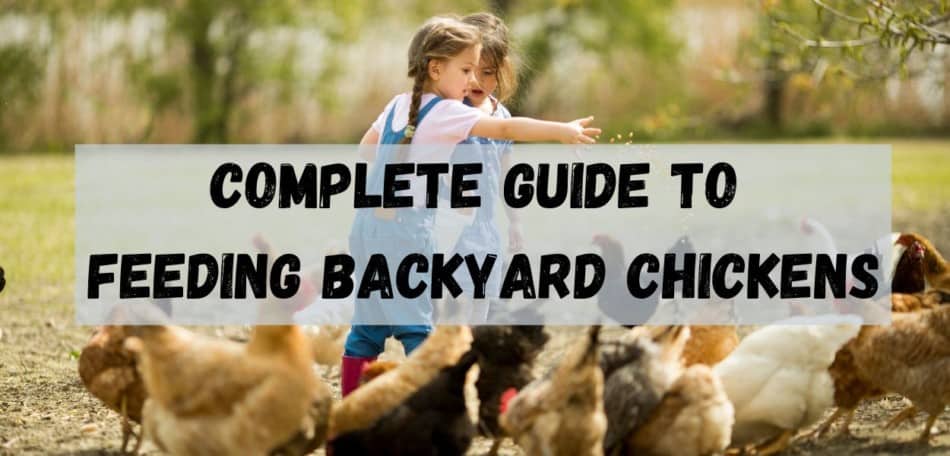Feeding backyard chickens properly is essential to keeping chickens at home successfully. If adequate feeding of your fluffy friends is neglected in any way, it shows up quickly in your bounty of eggs and the hens themselves.
A sound understanding of poultry diet will help you when keeping chickens as pets as you can really tailor the feed you provide to the specific needs of your hens and know when to make any necessary adjustments.
In this chicken guide, we provide you with the essentials you need to know to feed your hens confidently. Read on for advice on the
- The formulation of chicken feed
- Ideal feeding regimens
- Nutritional supplements
- How to identify malnutrition
- How to store your chicken feed
and more! We hope you will be fully equipped to feed your chickens an excellent diet that will keep you rewarded with the plentiful eggs you enjoy.
In a hurry to find the Best Food for your Chickens? Here are a few good ones.
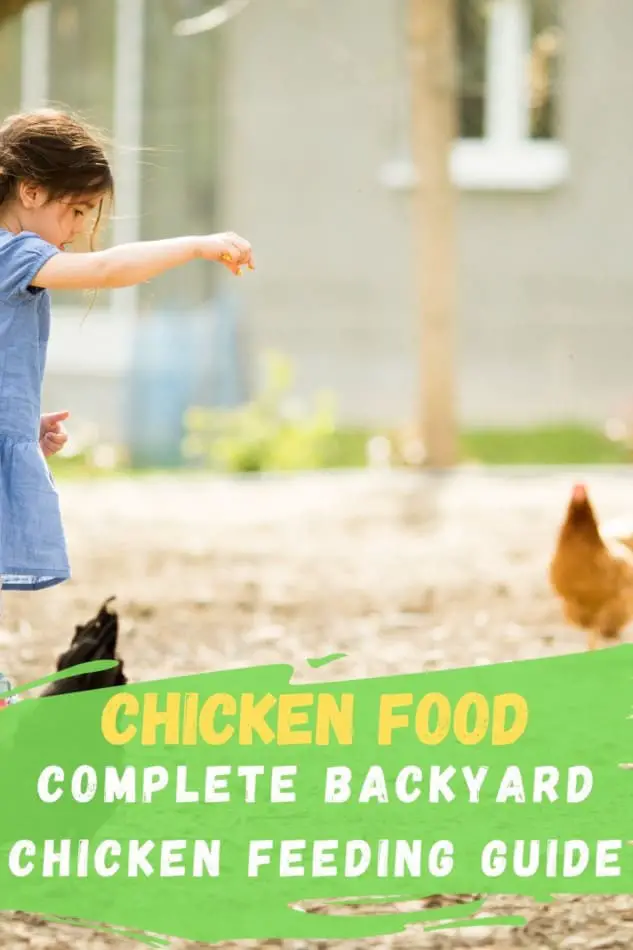
Table of Contents
Why diet is critical for your hens
Feed is a priority for your pet hens. Even if they are free-ranging and enjoying foraged insects and shoots, the only way that you can be sure that they are adequately fed is by providing a balanced diet. How you feed your hens will impact:
- Their growth. Although keeping hens at home is not usually for the purpose of producing meat, a balanced consistent diet is still needed for young laying hens to develop properly. Fully mature laying hens have a bodyweight of over 1350 grams so the diet provided will need to assist them in achieving and maintaining this.
- The quantity and quality of their eggs. Along with genes and body weight, nutrition directly affects egg production. The diet of your eggs will affect the hardness of the eggshell and the energy content of your hens’ diet will affect egg production.
- General health and resilience against disease. Malnourishment is a fast way for hens to become vulnerable to parasites and other illnesses.
- Hen behavior. Poor diet is a stressor and it can show up in hens that are aggressive or peck at one another as they compete for food.
Establishing the ideal diet for keeping hens at home will keep you on top of all these areas and should save you the cost and time of stressed hens, veterinary bills, and fewer eggs.
Dietary requirements for your backyard hens
Here are the key components of a balanced diet for chickens. Your choice of feeds and supplements should meet these requirements. A good poultry diet should consist of:
- Carbohydrates will provide your hens with the fuel to keep warm, active, and maintain their body weight. These carbs should be delivered in a format that is easy for the chicken to digest and utilize. For example, dried corn kernels may not be effectively broken down in the chicken’s gizzard and may pass straight through undigested.
- Protein is the powerhouse for growth and egg production. You will need to ensure that your birds derive their protein from more than one source to ensure that they acquired a full complement of the essential amino acids they need. Sources of protein typically include grains (like sorghum and barley) and soy. The amino acids lysine and methionine are noted to particularly affect egg production in poultry, so it is well worth selecting feed formulations that include these.
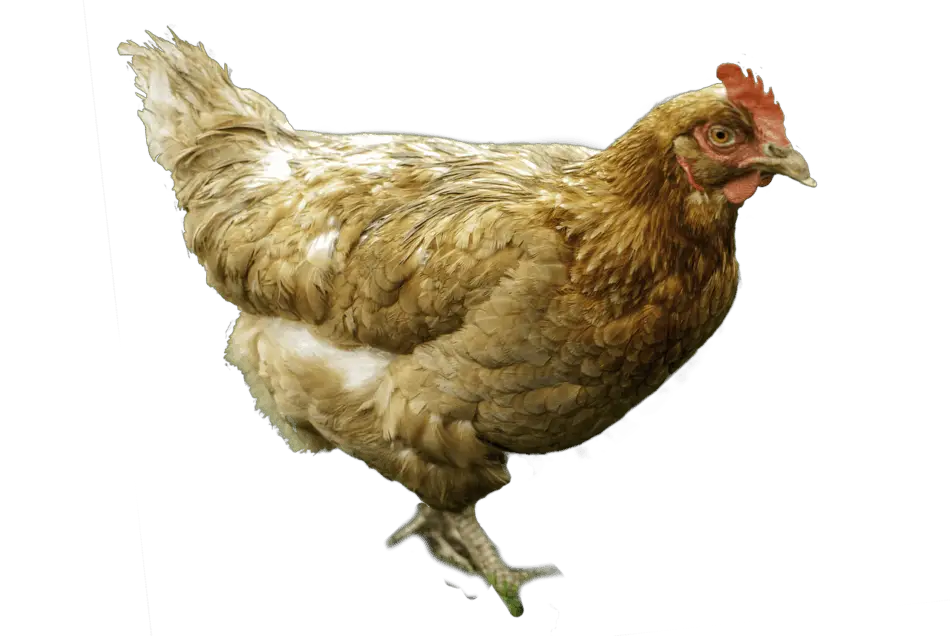
- Fat is also a good store of energy for birds, but care should be taken that it does not become excessive. Chickens can become obese and in hot weather, the excess layers of fat can cause overheating and death.
- Vitamins cannot be overlooked as deficiencies can rapidly lead to illness and death. Fat-soluble vitamins like A2 and D are key to good egg production and adequately hard shells. Vitamin B2 also plays a noted role in egg production and deficiency of B vitamins can cause toe-curling and other nervous system problems.
- Minerals are usually added to ‘fortified’ shop-bought chicken feed. Of course with the demands of laying, calcium will need to be in abundant supply!
- Water needs to be liberally supplied to your hens as they rely on it for hydration, digestion, egg production, and regulation of body temperature.
You will need to ensure that all these dietary elements are accounted for when feeding backyard chickens. If you are a newbie to keeping chickens at home, a commercially formulated and produced chicken feed is a safe bet.
Many poultry keepers and homesteaders often provide advice and recommendations on creating your own chicken feed, but if you miss out key ingredients deficiencies can quickly take hold. Let’s look at your options for optimally feeding backyard chickens.
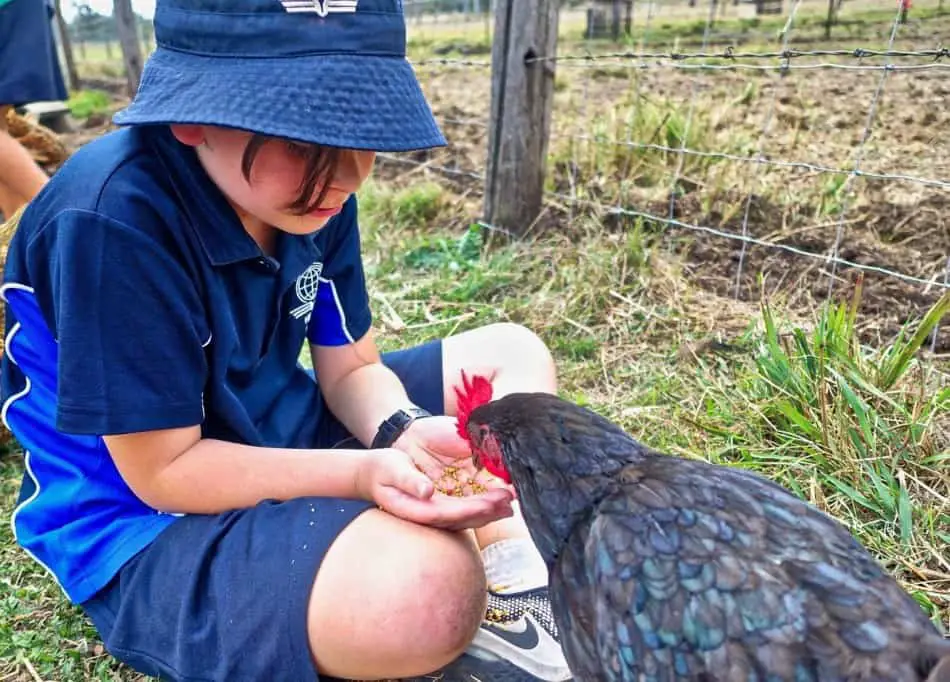
Recommended Chicken Feeds
Commercially produced chicken feed
These are nutritionally complete feeds for your hens that you can feed them straight out of the bag. These feeds typically contain, soybean oil meal, cereal grains (such as wheat, sorghum, and corn), canola, lupins, and vitamin and mineral supplementation. Some feeds also contain meat meal derived from fish and bone as a source of protein.
There are multiple chicken feed types available on the market.
- Mash is a ground poultry feed that is fed loose to your hens. It can be scattered or placed in your poultry feeders. As it is easy to digest, it is often fed to chicks and very young hens. You can also add hot water to it to make up a porridge-like consistency that some birds love.
- Pellets are made from condensed portions of mash poultry ration. They are a very convenient form of poultry feed as they store well and can be measured and fed easily with little waste. Your hens typically wolf these down hold and break them down for use in their digestive tract.
- Crumbles are literally crumbled pellets that are easier to be consumed by chicks and growing hens. You may find your chickens appreciate the crumbly texture in contrast to pellets.
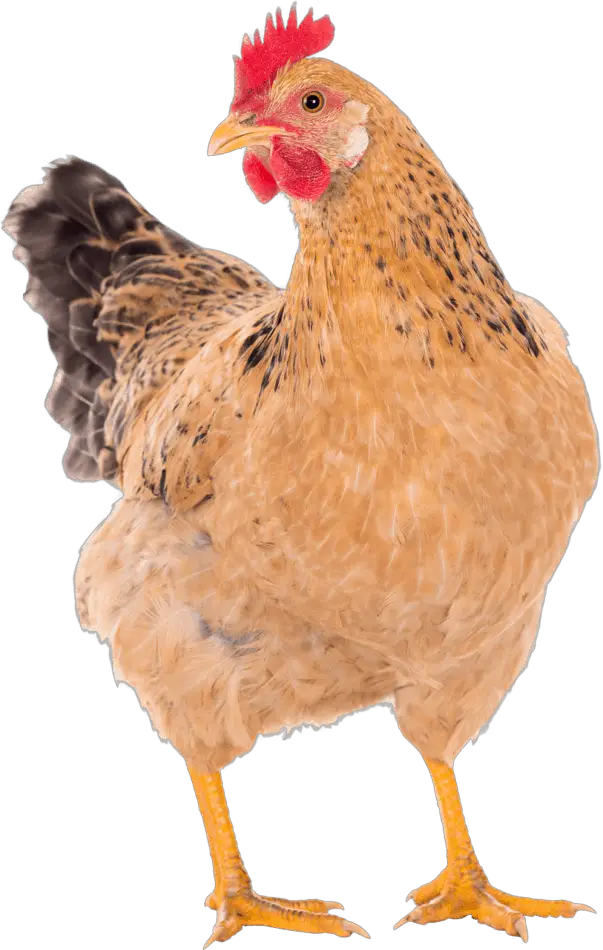
- Scratch grain is like chicken candy and should be fed as a treat for your flock. It is a delicious combo of cracked, rolled, or whole grains. You can scatter scratch feed on the ground for your hens to peck at. It is not suitable as a main source of food as it can be fatty.
- Layer chicken feed is an ideal formulation for laying hens and has a specific proportion of protein (between 15 and 18%) necessary to support optimal egg production.
- Grower chicken feed is a good option for younger hens that are still developing. Until they reach the point of lay, young hens will need a feed with at least 16% protein.
Simply choose the best type of chicken feed for the needs of your hens. When starting out with feeding backyard chickens keep an open mind and willingness to vary your brand or type of feed until you find a variety that works.
Alternative or natural chicken feed
As you gain confidence in feeding your chickens, you may want to experiment with varying their diet by including alternative food as part of their diet. There is a range of safe and nutritious foods that your hens will enjoy and can even be cultivated and dried to add to feeds.
No one food should predominate in a hen’s diet as this can cause malnourishment. Here is a list of example alternative and natural feeding options for keeping hens at home.
Plant-based foods
- Alfalfa is a popular protein and fiber-rich legume that adds great nutrition to your hens. If you grow a patch in your backyard, it will also improve your soil fertility. It can be fed fresh or dried and added to your hens’ feeder.
- Buckwheat is rich in essential amino acids and the fiber that will aid efficient gut motility in your birds.
- Nettle is a nutritious supplement despite being a weed. It is harmless when dried and can add a boost of protein and iron to your feed.
- Comfrey is another plant that you may have growing in your garden that you can use to nourish your hens.
Insects
- Mealworms are a popular treat for your hens which add protein and beneficial fats to their diet. Not only are they a flavorsome treat for your birds but they are also known to enhance the quality of your eggs. If you are not squeamish why not have a go at breeding your own mealworms.
- Black soldier fly larvae are known to be a well-balanced food for poultry and are a very sustainable source of protein.
Seeds
- Pumpkin seeds are rich in vitamin E and zinc that should hopefully enrich your eggs. For these to be digested effectively your chickens will require a diet with plenty of grit.
- Sunflower seeds like black oil and striped sunflower seeds are a great source of essential fatty acids.
Other foods
- Fresh sardines or tuna are pricey but particularly favored as a nutrient rich treat for your hens who will easily peck them to pieces.
- Food scraps such as pasta, rice, and cooked vegetable peels make a tasty meal for your hens.
Learn more about alternative feed options in our article “What to feed chickens naturally”
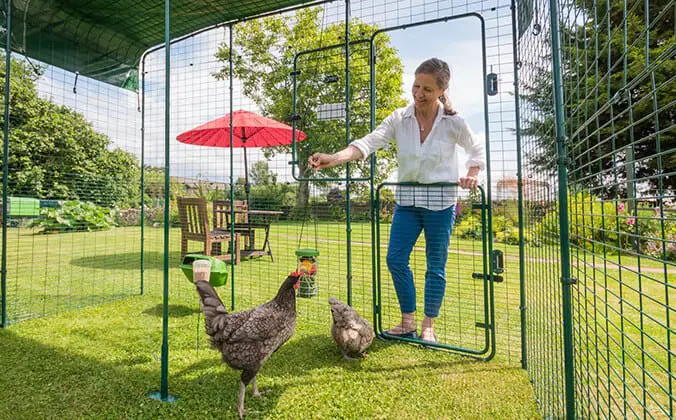
Why grit is an essential part of your chickens’ diet
Unfortunately, hens do not have teeth so they need to have another way of efficiently breaking down their food for digestion. This is done in a part of the hen’s digestive tract called the gizzard which has a thick muscular wall that can churn the ingested food forcefully.
Grit is added to your chickens’ food and is used to grind down the food in the gizzard. Oyster shells are usually ground to form a sharp grit with flinty shards that are added in with your hens’ feed.
It is also rich in soluble calcium that will help keep your eggshells extra hard.

Nutritional supplementation for backyard hens
From time to time you may want to undertake a course of nutritional supplementation, to aid recovery from injury or illness, correct deficiencies, or add resilience for winter, molting, and other stressors your chickens may encounter.
Here are some common options that can be sourced online or from your vet.
Poultry Spice is a mineral supplement that can be sprinkled into regular feeds.
Apple cider vinegar or garlic can be added to drinking water to boot digestive health and prevent parasites and bacterial overgrowth.
Tonics are of particular benefit when your birds are molting. They also can be added to drinking water for a nutritional boost with fat and water-soluble vitamins.
How do I feed my pet chickens?
- Firstly you will need to work out and measure the quantity of pellet, crumble or mash needed, based on the age, weight, and activity of your hens. A mature layer hen will get through 95-120g of feed daily. Keep this quantity available for each hen throughout the day.
- If you allow your hens to free-range or provide scraps they will eat less of the feed provided.
- Hungry hens that clear their feeder may need slightly more food added the following day. Be proactive in monitoring how much your hens eat to ensure they are adequately fed.
- Set a regular time for feeding each day. Add a fresh feed in the morning and again later in the afternoon. Food can be used to coax the back into the roost in the evenings.
- Never forget water! On a hot summer’s day, this is the difference between life and death. Keep water fresh, cool and topped up throughout the day

How can I be sure that my hens are getting enough feed?
Feed times can get competitive, especially if there is an established pecking order in your flock. If there is a lot of competition for the feeder, the quickest solution is to buy another feeder!
Observe each hen feed at intervals as reduced feeding is often a sign of illness. Poor growth, poor feathering, and susceptibility to disease may be due to poor diet.
Be alert to the need for increased feed volume and nutritional supplementation during winter and their annual molt.
How you store your feed is very important
Poor storage conditions of your bulk supply of feed can lead to contamination by pests, mold, and degradation of certain essential nutrients. Mold is a particularly serious problem as it can produce toxins that build up in your hen’s tissues and eggs.
If this happens anyone who eats affected eggs can be poisoned. Your supply of chicken feed should be kept indoors in an airtight container away from direct sunlight.
Also, take care not to leave uneaten food lying around as it can attract vermin to your coop.
Can you overfeed chickens?
You can’t overfeed chickens by leaving out extra food. Chickens will stop eating when they aren’t hungry. What can happen, however, is the extra food can attract pests or it can mold if there is any moisture.
How much should I feed my backyard chickens?
Depending on the feed, each chicken will need about 1/4 lbs of feed per day.
How long will a 50 lbs bag of chicken feed last?
This depends on how many chickens you have. If you only have 1 chicken, this will last about 200 days. If you have 25 chickens, that bag of feed will only last 8 days.
What should I feed my chickens?
Chickens need a balanced diet of chicken feed, fruits, vegetables, cooked beans, corn, and even meat.
In Conclusion: Chicken Feeding Guide
Getting feed right is a big part of having good success with keeping chickens at home. Feeding your hens an appropriate type and quantity of a complete poultry feed will keep most problems at bay.
Once you have established a good regimen you can try introducing other foods and forage to keep the nutrition of your hens at its best.

